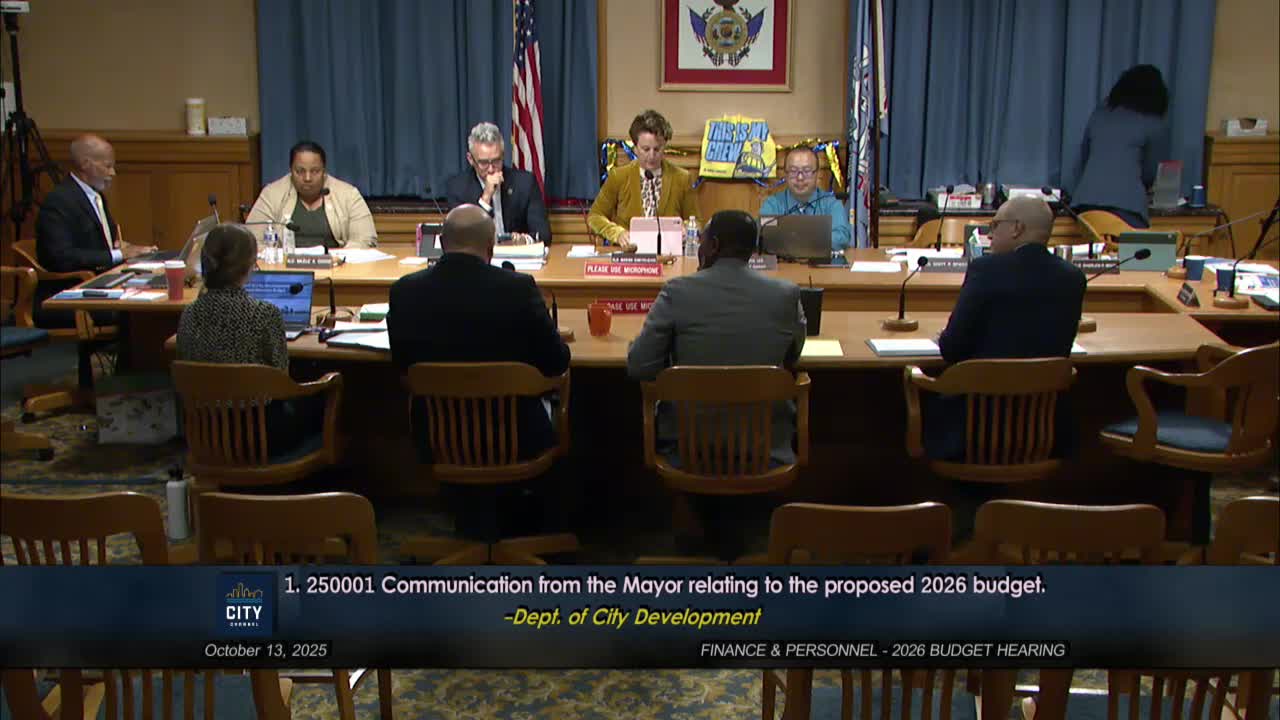City development and Rackham present 2026 budget priorities: Homes MKE finish, new homeownership fund, more commercial corridor grants and TIF activity
Get AI-powered insights, summaries, and transcripts
Subscribe
Summary
The Department of City Development and the public corporation Rackham told the Finance & Personnel Committee on Oct. 13 that 2026 priorities include finishing the Homes MKE rehab and resale program, launching a $1.6 million homeownership development subsidy to support 25 new infill homes, expanding commercial corridor grant funding to $1 million, and continuing TIF and Rackham activity to support housing and redevelopment.
The Department of City Development (DCD) and the Park‑area public corporation Rackham presented their 2026 proposed budgets and program plans to Milwaukee’s Finance & Personnel Committee on Oct. 13, 2025, laying out housing initiatives, commercial corridor investments and tax‑increment financing activity the administration intends to advance.
Budget headline and major drivers
Budget staff said DCD’s proposed 2026 budget is about 8.5% higher than the 2025 adopted level, primarily reflecting salary and personnel changes after an historical Rackham contribution to DCD salaries was reduced. The administration also identified a $1,000,000 restoration for the commercial investment program and capital proposals to support homeownership development.
Homes MKE, new homeownership development fund and down‑payment assistance
DCD summarized progress on Homes MKE (an ARPA‑funded housing rehabilitation and resale program): the department reported 50 homes sold to new buyers, 32 homes under construction and roughly 20 additional homes in pre‑development that the city expects to complete in 2026.
To stimulate new infill home construction, the mayor’s proposed budget includes a new Homeownership Development Fund of $1,600,000 paired with other sources to provide gap financing for small‑scale infill homes (townhomes, duplexes, cottage courts and select detached homes). The presentation said this “Revive Housing Development Initiative” aims to fund roughly 25 new for‑sale homes in its first year.
DCD reiterated support for a city down‑payment assistance program that has assisted more than 1,100 homebuyers since 2021 with roughly $7 million in deployment across multiple funding sources. The mayor’s 2026 proposal includes $600,000 for down‑payment assistance — the same amount the council adopted for 2025 — and staff emphasized that the program has been funded from a mixture of sources, including ARPA and TIF affordable‑housing set‑asides in prior years.
Commercial corridor grants and neighborhood investment
DCD said the commercial corridor grant program issued 89 awards in 2025 (about $800,000 in city investment year to date) and that about 78% of grantees were business owners of color. The mayor’s proposal increases the commercial revitalization pool to $1,000,000 for 2026, up $500,000 from the 2025 adopted level. Rackham and DCD staff also noted that TIF amendments and closures are creating additional resources for housing and corridor investments.
TIF activity, Rackham role and real estate sales
DCD and Rackham staff said the city had created or amended several TIDs (tax incremental financing districts) since 2024 to support affordable and workforce housing, economic development and public infrastructure. Staff noted that several TIDs are projected to close — and to provide additional funds for citywide affordable housing programs — as projects complete and taxable value increases.
Rackham reported a multi‑source 2026 budget that includes federal and state grants and local maintenance and property‑management costs; staff said the Rackham budget was lower in 2026 than 2025 principally because some grant revenue and project timing changed.
Council questions: funding tradeoffs and metrics
Committee members pressed DCD staff for more detail on the tradeoffs between funding new construction (which carries higher per‑unit subsidy) and funding down‑payment assistance and rehab programs that help buyers occupy existing homes. Staff emphasized the city’s role as one of several regional funders and said DCD would continue to pursue TIF amendments, public‑private partnerships and CDA (Community Development Alliance) support to stretch scarce subsidy dollars.
Committee members asked for: a five‑year breakdown of TIFs that closed and their affordable‑housing proceeds; a district‑level map and list of commercial corridor grants and amounts; trend data on BOZA appeals and outcomes; and more detailed reporting on Rackham property sales and disposition proceeds.
Next steps
DCD promised follow‑up materials at the committee’s request, and the mayor’s proposed budget will move through the committee and council process. The committee recorded a procedural hold to the call of the chair on the mayor’s budget communication and a separate hold on the Redevelopment Authority budget communication (see Votes at a glance).
